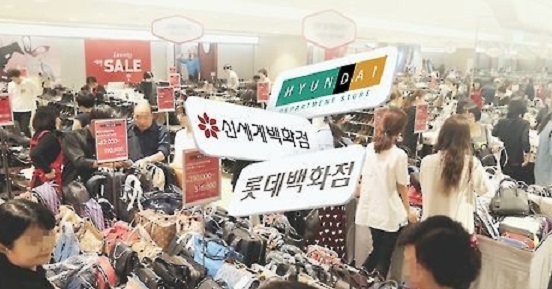Retailers are struggling with weak sales amid unfavorable market conditions industry data showed Friday, with prospects of new government regulations adding to their worries.
According to the sales tally, April's numbers by major department stores shrank nearly 2 percent compared to same month last year. Lotte showed a 1.9-percent contraction while sales at Hyundai fell 1.6 percent. The lone increase in sales was in the home appliances sector from the wedding season in spring.
 |
(Yonhap) |
Retailers had hoped for a big pickup in May, boosted by the extended holidays early in the month, but it fizzled out. Sales had gained 2.8 percent during the May 1-6 holiday period, but the record for May 1-17 showed blunted growth of 1.4 percent, meaning business slowed down immediately after the holiday.
"The number of shoppers and sales were lower than expected due to weather factors like fine dust," an industry official said. "We had hoped for a recovery after a push during the holiday, but it seems that the recoup of consumer sentiment is still weak."
Another source of concern for the retail industry is regulatory moves by the new government. President Moon Jae-in during his campaign had signaled restrictive measures that would limit construction of large malls, prohibit big shopping centers from doing business between midnight and 10 a.m., and require two days of closure per month.
Such steps would force a U-turn for retailers who sought growth through giant shopping malls and discount outlets that provide not just shopping but combine it with other services like entertainment. Such strategy has been criticized by some as robbing smaller shops of their business. A number of regional governments have required conglomerates to reach a prior agreement with small merchants for co-prosperity before they are given permission to build malls.
At the same time, the fallout from South Korea's hosting of THAAD, a US missile defense system fiercely opposed by China, continues, officials said. China in retaliation barred travel agencies from selling tour packages to South Korea, severely hurting local businesses where Chinese visitors were the biggest customers.
"We are worried that the business environment will worsen from the new government's regulations when consumption has not yet recovered," another industry official said. "It would help if the THAAD issue is resolved, but the fallout will probably last for some time." (Yonhap)


![[Herald Interview] 'Korea, don't repeat Hong Kong's mistakes on foreign caregivers'](http://res.heraldm.com/phpwas/restmb_idxmake.php?idx=644&simg=/content/image/2024/11/13/20241113050481_0.jpg)
![[KH Explains] Why Yoon golfing is so controversial](http://res.heraldm.com/phpwas/restmb_idxmake.php?idx=644&simg=/content/image/2024/11/13/20241113050608_0.jpg)




